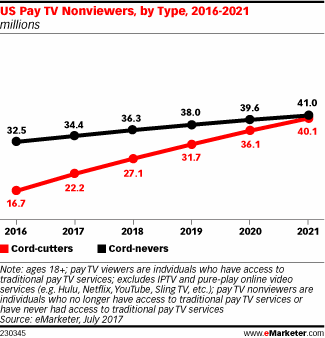 According to a report from eMarketer, 56 million+ U.S. consumers will go without pay TV access this year. The growth of live streaming and on-demand viewing are key contributors to this trend, along with a decline in viewership. … Read More
According to a report from eMarketer, 56 million+ U.S. consumers will go without pay TV access this year. The growth of live streaming and on-demand viewing are key contributors to this trend, along with a decline in viewership. … Read More
 Criminal. Is it any wonder advertisers are rethinking their digital media investments. SSPs optimizing yields (theirs and the publishers) by defrauding advertisers raises serious concerns centered, once again, around the lack of transparency.
Criminal. Is it any wonder advertisers are rethinking their digital media investments. SSPs optimizing yields (theirs and the publishers) by defrauding advertisers raises serious concerns centered, once again, around the lack of transparency.
Deceptive price price floors, misstated bidding methodologies lying about which publishers they represent and the unauthorized reselling of inventory are practices that must be halted. Advertisers would be right to ask; “Where is my media agency? Why aren’t they protecting my interests when it comes to preventing this type of abuse?” Sad state of affairs … Read More.
 Scary article in Mediapost. According to WARC out of London, martech fees now represent 16% of marketing budgets.
Scary article in Mediapost. According to WARC out of London, martech fees now represent 16% of marketing budgets.
Where does this money come from? Marketers aren’t increasing their budgets by this amount. Agency fees haven’t gone down by this amount. Third party vendor expenses haven’t decreased by this amount. Must have come directly out of advertiser message delivery…
Wonder why advertiser’s are questioning marketing efficacy in the wake of stagnant brand growth? … Read More
Artificial intelligence (AI) is already reshaping how advertising is developed, planned and placed. The marketing applications being envisioned and adopted by agencies, consultancies, publishers and advertisers are nothing short of remarkable.
From the onset of “Big Data” it stood to reason that the concept of predictive analysis, the act of mining diverse sets of data to generate recommendations wouldn’t be far behind. Layer on natural language processing, which converts text into structured data, and it is clear to see that “deep learning” is on the verge of revolutionizing the ad industry. As it stands, algorithms are currently optimizing bids for media buying, utilizing custom and syndicated data to match audience desires (or at least experiences) with available inventory.
Effective, efficient, automated methodologies for sorting through vast volumes of data to evaluate and establish patterns that reflect customer behavior for use in segmenting audiences and customizing message construction and delivery holds obvious promise.
So, what does this mean for media agencies? Will they be at the forefront of automation technology? Or will they be swept away by the consultancies and ad tech providers that are already investing here?
If media agencies desire to remain in control as the industry evolves, there are real challenges that they will have to address to remain viable:
- Re-establish role as “trusted advisor” with the advertiser community. Recent concerns over transparency, unsavory revenue generation practices and a failure to pro-actively safeguard advertisers’ media investments from fraud and from running in inappropriate environments have created serious client/ agency relationship concerns.
- Attract, train and retain top-level talent to re-staff media planning and buying departments. The focus will need to be on bridging the gap between developing, and applying automation technology and providing high-level consulting support focused on brand growth to their clients. Presently, media agencies are not effectively competing for talent, whether in the context of compensation and or personal and career development options being offered by their non-traditional competitors.
- Provide a framework for addressing the compensation conundrum. Whether this is in the form of cost-based or performance-based fees tied to project outcomes, commissions or hybrid remuneration systems, tomorrow’s successful media agencies will need to establish clear, compelling compensation systems. These systems will need to reflect value propositions that will differentiate them from an expanded base of competitors, while offsetting (to some extent) non-transparent sources of revenue that many media shops have come to rely on in recent years.
This will not be an easy path for media agencies, particularly for those that are hampered by legacy systems, processes and management perspectives that may limit their ability to more broadly envision and ultimately, assist client organizations addressing their needs and expectations.
Either way, the race is on, as management consulting firms are acquiring various marketing and digital media specialist firms and as media agencies raid the consultancies for personnel to build out their strategic consulting capabilities. The key question will likely be, “Which business model holds the greatest promise, in the eyes of the Chief Marketing Officer, for improving brand performance?”
 Interesting article from AdExchanger regarding the evolving agency trading desk model. Embedding specialists on client teams to boost impact and transparency makes good sense, assuming the talent level is there to support that.
Interesting article from AdExchanger regarding the evolving agency trading desk model. Embedding specialists on client teams to boost impact and transparency makes good sense, assuming the talent level is there to support that.
Thus eliminating certain “centers of excellence” such as the trading desks and or consolidating agency brands will be a necessary (and welcome) approach. While clients seek the best possible solutions, they do care which business cards agency/ affiliate personnel carry… when they’re paying incrementally for those services.
So, yes, remuneration schema will have to evolve to support this new approach … Read More
 Interesting article in MediaPost dealing with the vagaries of programmatic digital media auction methodologies.
Interesting article in MediaPost dealing with the vagaries of programmatic digital media auction methodologies.
Rogue players, operating with little or no transparency, without the agency buyers even knowing what auction methodology is being utilized to establish inventory pricing/ select winning bids… Is it any wonder why advertisers such as P&G, Unilever, L’Oreal and others are rethinking their digital media investments? … Read More
 Nice job by AdNews capturing this publisher’s overstatement of its audience.
Nice job by AdNews capturing this publisher’s overstatement of its audience.
That said, wonder whether or not the ad agency community would have investigated and uncovered same? No wonder advertisers are rethinking their digital media investments … Read More
 Advertising agencies are finding that organic growth will be a difficult objective to achieve in the near-term.
Advertising agencies are finding that organic growth will be a difficult objective to achieve in the near-term.
One contributing factor comes in the form of marketing spending constraints on the part of advertisers. Why? Organizations are feeling pressure to control costs in the wake of lack luster market conditions that are limiting growth and reducing margins.
The key economic indicator driving advertiser concern is “slow growth” which is impacting many sectors of the economy:
- GDP growth of 1.2% during the 1st quarter and 2.6% in the 2nd quarter (short of the sustained 3%+ growth rate promised by the White House).
- U.S. retail sales, excluding auto and gasoline, rose 0.5% in July ’17.
- Fast-Casual restaurant sales fell more than 3% in the first quarter of 2017.
- U.S. automotive sales have fallen for seven straight months (Jan. – Jul.).
- Homebuilder confidence sank, posting HMI’s lowest reading in over 6 mos.
Two CPG giants have announced dramatic moves, which reflect the nature of this challenge. Unilever signaled its intent to reduce the number of agencies on its roster by 50%, while cutting the quantity of ads produced by 30%. Procter & Gamble Co. indicated that it would trim $2 billion in marketing spend over five years as part of an enterprise wide expense reduction initiative.
It is worth noting that there are motivations beyond “cost reduction” driving these decisions by advertisers. Consider fast-food giant McDonald’s, which earlier this year trimmed the number of agencies that it works with from 60 to fewer than a dozen. Their goals included streamlining marketing and improving the consistency of their output… in addition to reducing expenses.
Unfortunately, the impact of slower spending by advertisers is being felt on Wall Street. According to an August, 24 article in the NY Times, WPP which had earlier cut its revenue forecast saw its share price decline by 10.9% in London, with Omnicom Group and Interpublic Group falling 7% and 6.3% respectively in the U.S. and media stocks are generally lower as a sector.
Interestingly, advertisers have made a conscious decision not to fuel marketing spend to counter slowing sales, but to cut spending to protect margins, which is particularly concerning to the ad agency community.
With increased competition from non-traditional players (i.e. management consulting and technology firms) and the continued fall-out from an industry transparency crisis, the lack of confidence on the part of marketers regarding advertising’s ability to drive profitable revenue growth is certainly a worry.
Whether or not this slowdown in organic growth on the part of ad agencies portends a slump, remains to be seen, but at the very least the macro-economic uncertainty will serve to increase industry volatility. Perhaps the industry can find some solace in the words of Yogi Berra the hall of fame catcher and manager of the New York Yankees: “Slump? I ain’t in no slump… I just ain’t hitting.”
 Insightful piece by Mike Farmer on MediaVillage.com. It remains clear that one key to rebuilding client-agency relationships and improving the levels of trust and transparency is the need to address the issue of agency remuneration.
Insightful piece by Mike Farmer on MediaVillage.com. It remains clear that one key to rebuilding client-agency relationships and improving the levels of trust and transparency is the need to address the issue of agency remuneration.
Eliminating non-transparent sources of revenue, aligning scopes of work with required resource levels and incenting good work from agency partners will require meaningful dialog on the means and level of compensation … Read More
 Well said Marla. Your perspective regarding the opportunity to strengthen the working relationship between the 4A’s and the ANA as a critical step in rebuilding agency-marketer trust is spot on. Thank you for sharing your point of view and the 4A’s proposed “imperatives” … Read More
Well said Marla. Your perspective regarding the opportunity to strengthen the working relationship between the 4A’s and the ANA as a critical step in rebuilding agency-marketer trust is spot on. Thank you for sharing your point of view and the 4A’s proposed “imperatives” … Read More

